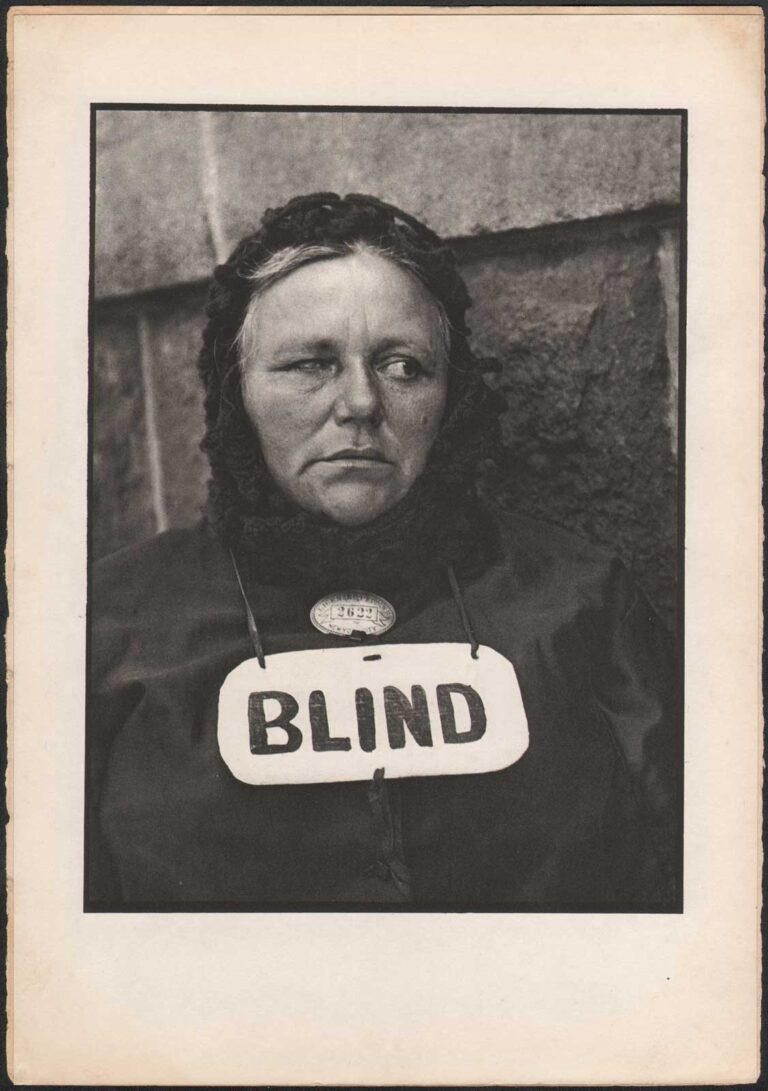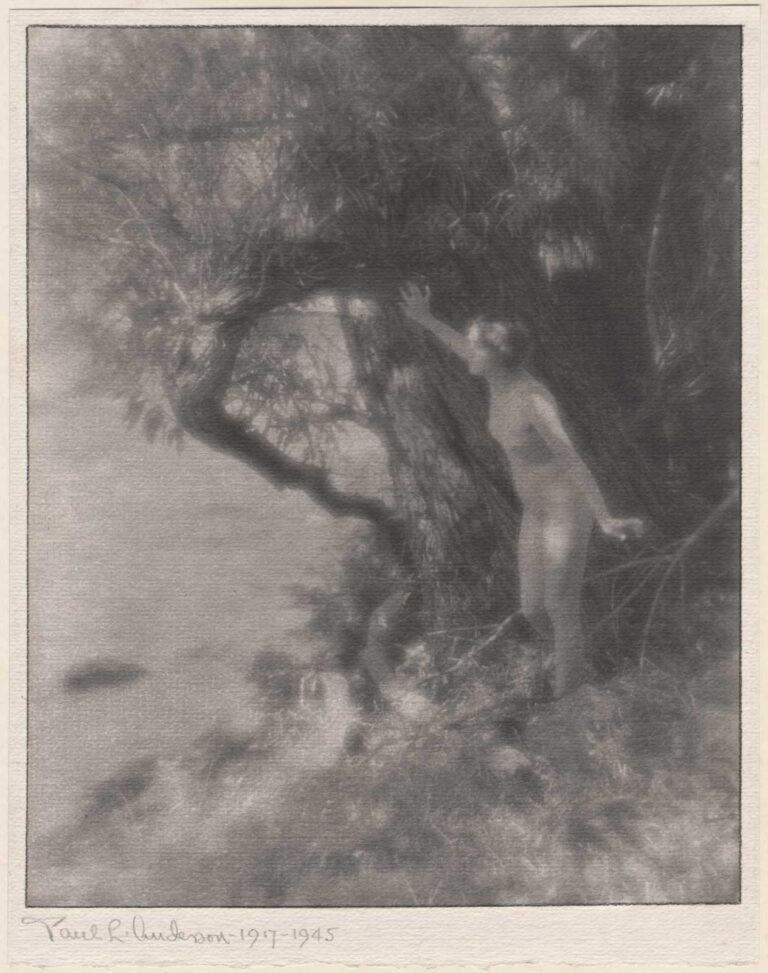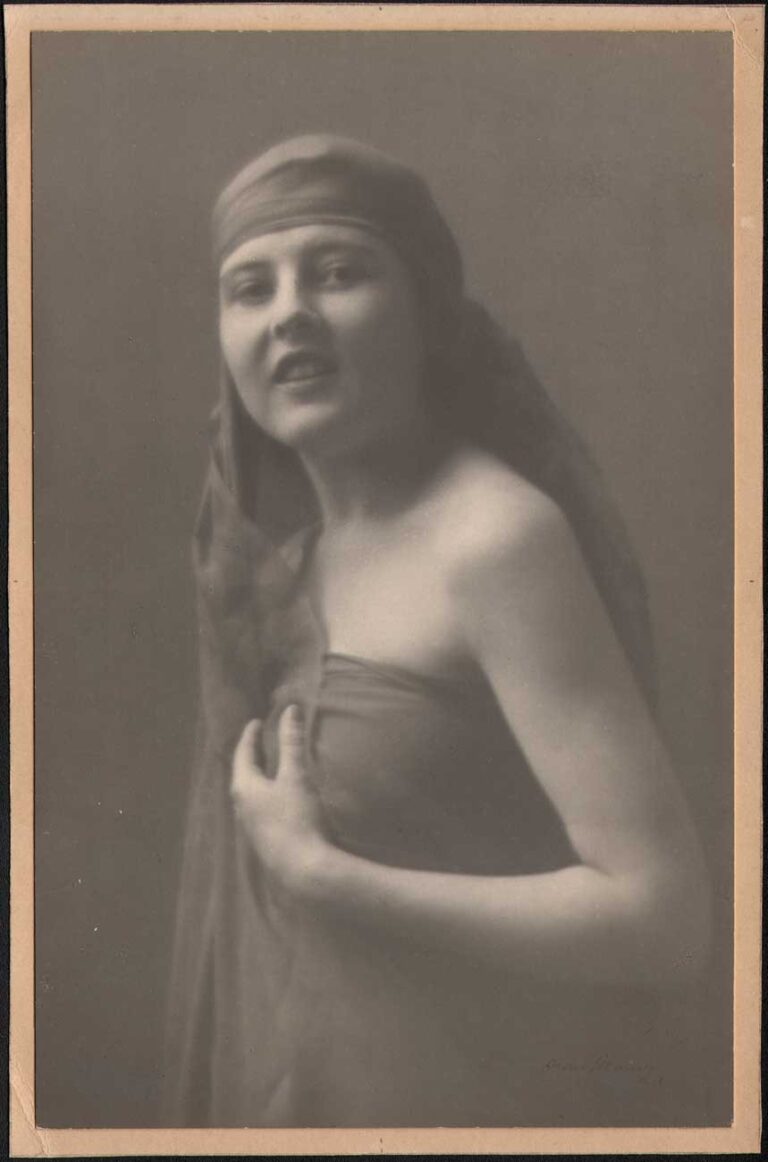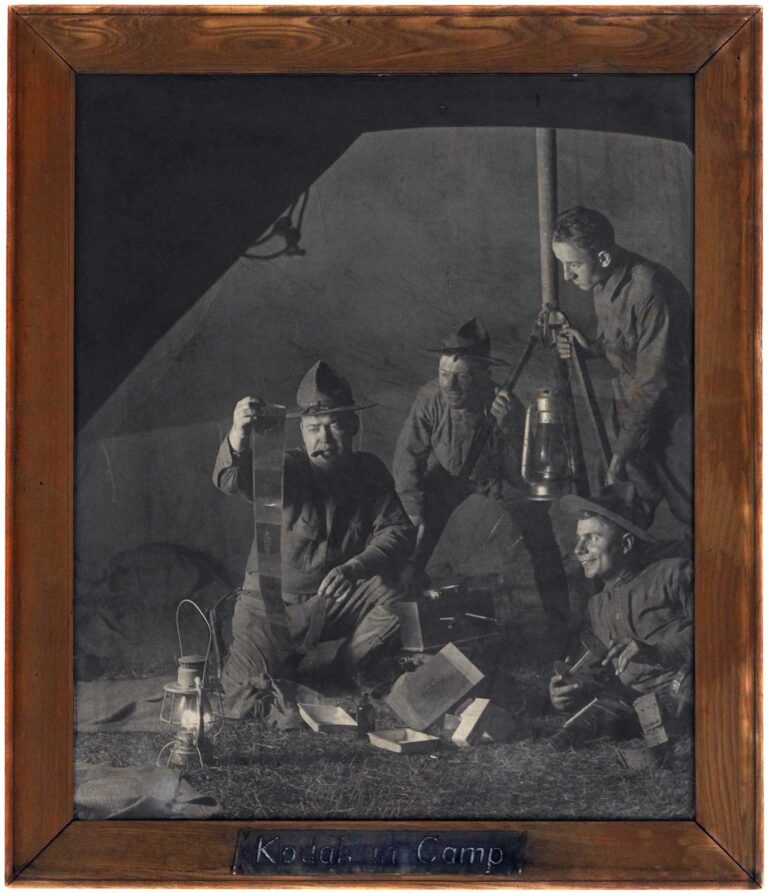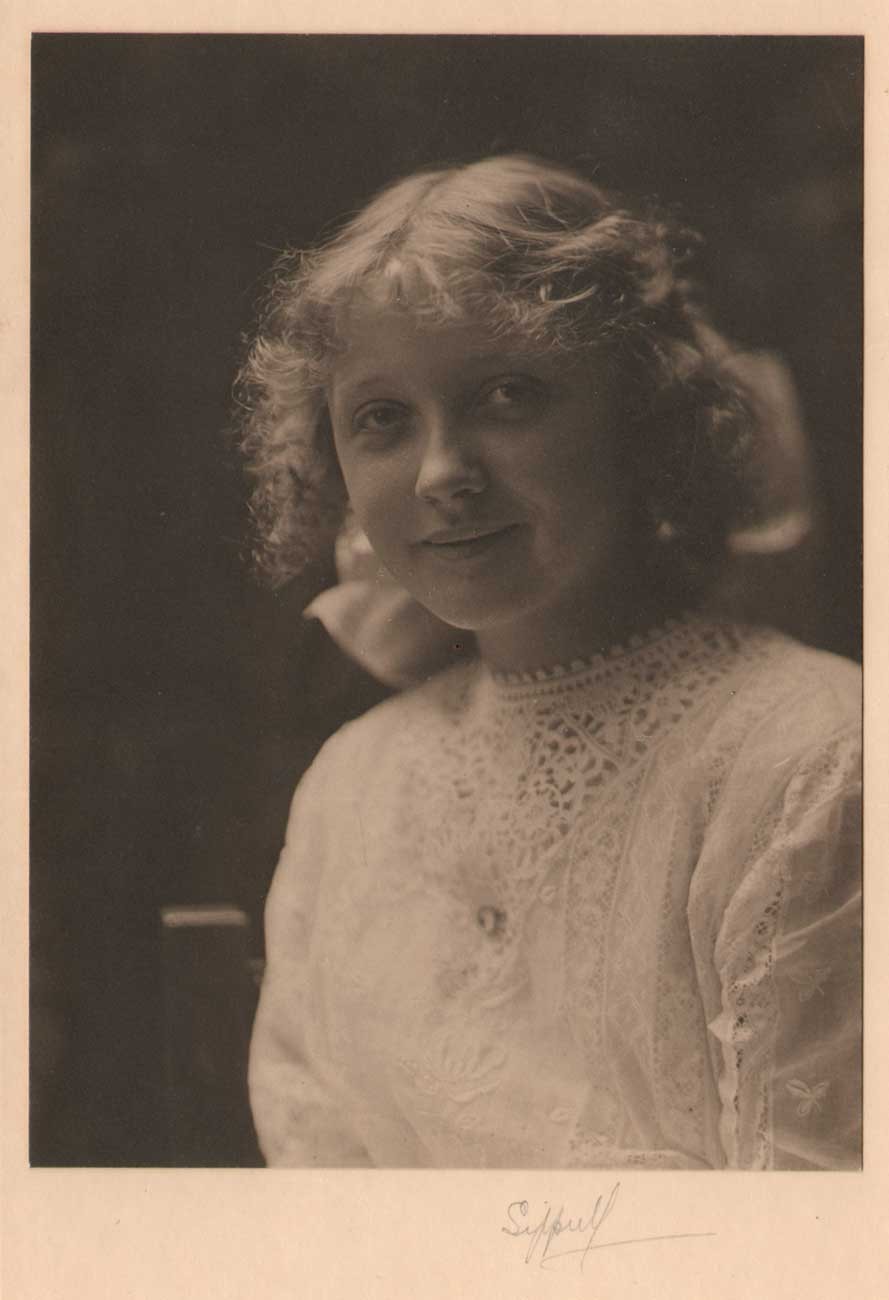
Portrait: Coralyn M. Channen
Coralyn Channen photographed at the Sipprell Studio
Coralyn M.(ildred) Channen, (b. Oct. 5, 1901) from Buffalo, New York, seemed destined to be photographed. In 1905, (New York Census record) her father Benjamin Channen’s occupation is listed as photographer, running his studio from the family home at 332 Hampshire St. By 1908, an advertisement in the May 8, 1908 edition of the Buffalo Courier newspaper states B.R. Channen was maintaining business as a “West Side Decorator” from the home so he must have found it necessary to pursue other pursuits, at least until the 1920’s or 30’s, where surviving photographs of a now much older Coralyn bear his imprint as B.R. Channen. East Aurora. N.Y. on cardboard photographic presentation folders. 332 Hampshire St. certainly had an intriguing background: it had formerly been used as the portrait studio for Buffalo photographer William McFadden, with several surviving cdv’s discovered while doing research for this entry bearing this same address.
When this series of five photographs of a young Carolyn Channen were taken around 1917-18 by the Sipprell studio, she would appear to be approximately 17-18 years of age, with the evidence she holds a diploma in several giving credibility they were done as a keepsake of graduating from high school. If that was the case, she would only have had to walk ten minutes to the studio from her school, then located at 795 Elmwood Ave. (by 1922 the studio had moved to 528 Elmwood)
Biographical Details: Coralyn M. Channen
1918: estimated year she would have graduated from Buffalo’s Lafayette High School.
1919: graduates August 21, 1919 from Bryant & Stratton Business College in Buffalo with a diploma from the “Shorthand Department”. source: Buffalo Courier, Aug. 22, 1919
1927-1930: now married, she attends the University of Michigan along with spouse Leslie M. Farr. (b. 1906) They are both listed under “Literary” for 1931 in the school’s alumnae compendium with a home address of Eggertsville, N.Y.
1940: U.S. Census lists no occupation for Coralyn; Leslie is President of Conshafter & Farr, Inc. “dealers of Dodge and Plymouth motor cars in Buffalo, New York.” The business at 1501 Kensington lasts until at least 1950.
1974: dies June 15 in Orange County, Florida after having remarried at some point to William C. Foreman. The Sipprell Studio
The Sipprell Studio
The owner of this studio was Frank J. Sipprell. (1878-1958) Those familiar with photographic history may recognize this surname as belonging to his more famous sister Clara Estelle Sipprell, who actually got her start at the studio. As much as I would like to give credit to her or even to both for these series of photos of Coralyn Channen, it would seem fruitless given the fact the photos are not dated, although they were most definitely done at the same sitting. However, it is intriguing to consider these are platinum print portraits done with a soft-focus lens and available light-most likely after 1915 when Clara had left Buffalo for New York City to establish her own studio. These aforementioned details are all hallmarks Clara Sipprell is known to have employed throughout her working career-especially her well-known rejection for the new fangled artificial light method of taking photographs!
Even the mount autographs ask questions from the past. With one exception, the Channen portraits as well as the earlier 1903 dated wedding group portrait by the Sipprell studio on PhotoSeed are simply signed Sipprell in graphite and underlined: the customary way Clara E. Sipprell was known to have written her surname for her own work in later authenticated photographs. (but with the addition of Clara E. ) A portrait of Frank’s wife Lucy Sipprell done around 1913 in the collection of the Smithsonian is signed CES however, in keeping with the period style and preference many photographers employed for their best efforts: art photographs signed with only initials or a monogram often entered in salons or camera club exhibitions.
It could be assumed as well that Coralyn Channen’s father Benjamin likely knew Frank Sipprell as well as his sister through his own photographic business pursuits. Because of all the photographic cross-pollination that undoubtedly took place during Clara’s decade of working with her brother, it seems important in this space to devote additional biographical details for each.
The Founder: Francis James Sipprell : 1878-1958
Francis J. Sipprell was a photographer specializing in portraiture. He moved to Buffalo in 1895, began working in Eleck F. Hall’s studio in 1898, and in 1902 opened his own studio at 487 Delaware Avenue. His sister, Clara E. Sipprell joined him in the studio in 1905. In 1913, he became a member of the Executive Committee for the Professional Photographers Association of New York. He was a member of the Buffalo Camera Club, becoming secretary in 1914. In 1938, Francis Sipprell moved his studio to East Aurora. When he retired in 1948, the business was passed to his son, Allen. (1.)
Clara Estelle Sipprell: 1885-1975
The well-known American portrait photographer Clara E. Sipprell was born in Canada. The death of her father at a young age forced the family to soon move to Buffalo, New York, where she arrived in 1895. She developed an interest in photography after her oldest brother Frank (she had five older brothers) first worked in a commercial studio and then established his own by 1902.
In her memoir: Moment of Light: Photographs by Clara Sipprell published in 1966, Sipprell dedicates the volume to him: “For Frank, my brother, who started me on my photographic way.” The book goes on to discuss this early influence:
The eldest, Frank, became a photographer and soon had a shop of his own. Here Clara spent her afternoons after school and her Saturdays. A day came when, at sixteen, she went to the shop instead of going to school. Frank said nothing; he let her stay. She never went back to school; she had found her direction in life. (from Introduction, unpaginated)
The 1905 date referenced in Frank’s biography above would appear erroneous, because Clara at the latest would have joined him full time in his new studio when she was 16 years old, in 1902, the same year it opened for the first time.
Clara Sipprell: biography continued
Syracuse University in New York state as well as the Amon Carter Museum of American Art Archives in Texas hold the vast amount of correspondence by Clara Sipprell and many of her original negatives and prints. The following biography is included with this correspondence as part of online material at Syracuse:
Clara E. Sipprell (1885-1975) was a Canadian-American photographer, known for her landscapes and for portraits of famous actors, artists, writers and scientists. Sipprell was born in Canada, a posthumous child with five brothers. Her widowed mother had to work to support the family, and Clara lived with her grandparents until she was old enough to go to school. Henry, the next to eldest, went to Buffalo, New York, where he found work and soon drew the rest of the family after him. The eldest boy, Frank, became a photographer and soon had a shop of his own.
Clara spent her free time in her brother’s shop. At the age of sixteen she left school and devoted her entire time to what was to become her life’s work. For ten years she assisted her brother Frank, learning photographic techniques during the period of the glass plate and platinum paper. When artificial lighting began to be used, her brother adopted it, but Clara stuck to the old ways. By doing so, she was setting up her own standards and establishing her own ideas of what a photograph should be. She has never used artificial lighting, believing that natural light would give the result she preferred. She does not enlarge, nor does she crop her photographs to manipulate her composition; implicitly the composition must be complete before the picture is made. It is claimed also that she does not retouch her negatives, although there is some evidence in the collection to the contrary.
Her early exhibitions were at the Buffalo Camera Club at a time when its membership was closed to women; one year she won half the prizes offered. Her first New York show was at Teachers College, Columbia University, and she subsequently opened a studio in Greenwich Village. The work of several New York photographers taught her much, she says; Alfred Stieglitz, Edward Steichen, Dr. Arnold Genthe, Max Weber, Clarence White, Gertrude Kasebier, and Alice Boughton were among them. She became a member of the Pictorial Photographers of America, the Royal Photographic Society of Great Britain, and the Arts Club of Washington.
A Russian friend arranged for her to photograph Stanislavsky’s Moscow Art Theatre troupe, the first of a number of seminal opportunities for her. A trip to Vermont opened up further vistas for her, and she engaged a studio in the Connecticut River Valley village of Thetford which she maintained for seventeen summers. When her partner married a Yugoslav, she was introduced to that country as a subject for her photographs. Her god-daughter, Nina, the child of this marriage, became a subject of constant interest. Her friends planned a trip to Sweden for her in 1928, arranging opportunities for her there which included access to the Royal Palace, and photographs of King Gustav and other members of the Swedish royal family were the result.
Many famous personalities came to her for portraits. Among these were Albert Einstein, Robert Frost, Edwin Markham, and Pearl Buck as well as the musicians and composers contained in this collection.
During the 1920’s and ’30’s, Clara Sipprell often received prizes in various national and international exhibits which included her work in landscapes and still lifes as well as portraits. One of her cityscapes, “New York-Old and New”, was one of the first photographs acquired by the Museum of Modern Art in 1932. The move of her summer studio to Manchester Center, Vermont, from Thetford Hill came about largely through her friendship with Dorothy Canfield Fisher, the writer, who wrote the first publicity for her after the move. Annual trips to Spain and Portugal, Italy, Greece, Japan, Great Britain, France, and to visit friends in Yugoslavia provided new experiences and new subjects for her camera. A collection of sixty photographs, which included several taken as a result of these trips as well as many portraits of those whom she regards as the “great ones”, was chosen for exhibition at Syracuse University in 1960. Miss Sipprell died in 1975 at the age of 89.
Cf. Elizabeth Gray Vining, “Introduction” to Moment of light, photographs of Clara Sipprell, New York, John Day Company, c1966.
print notes: Title of work supplied by this website; signed Sipprell in graphite at lower right corner of primary mount, with transfer of photographic image opposite within presentation folder. Assigned date of 1917 based on perceived age of subject.
1. Francis J. Sipprell: at: Burchfield Penney Art Center (at SUNY Buffalo State) online resource accessed May, 2015.
